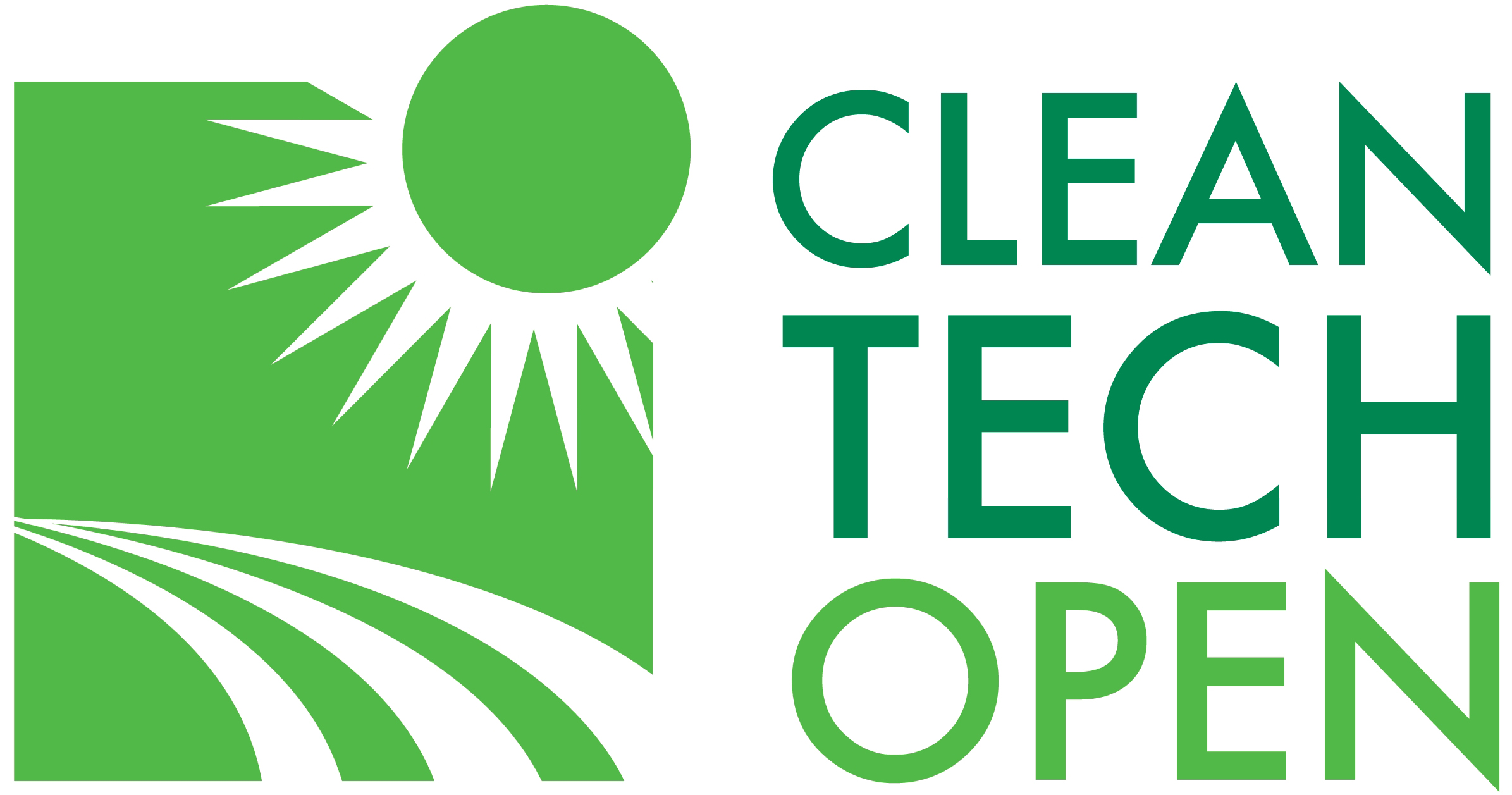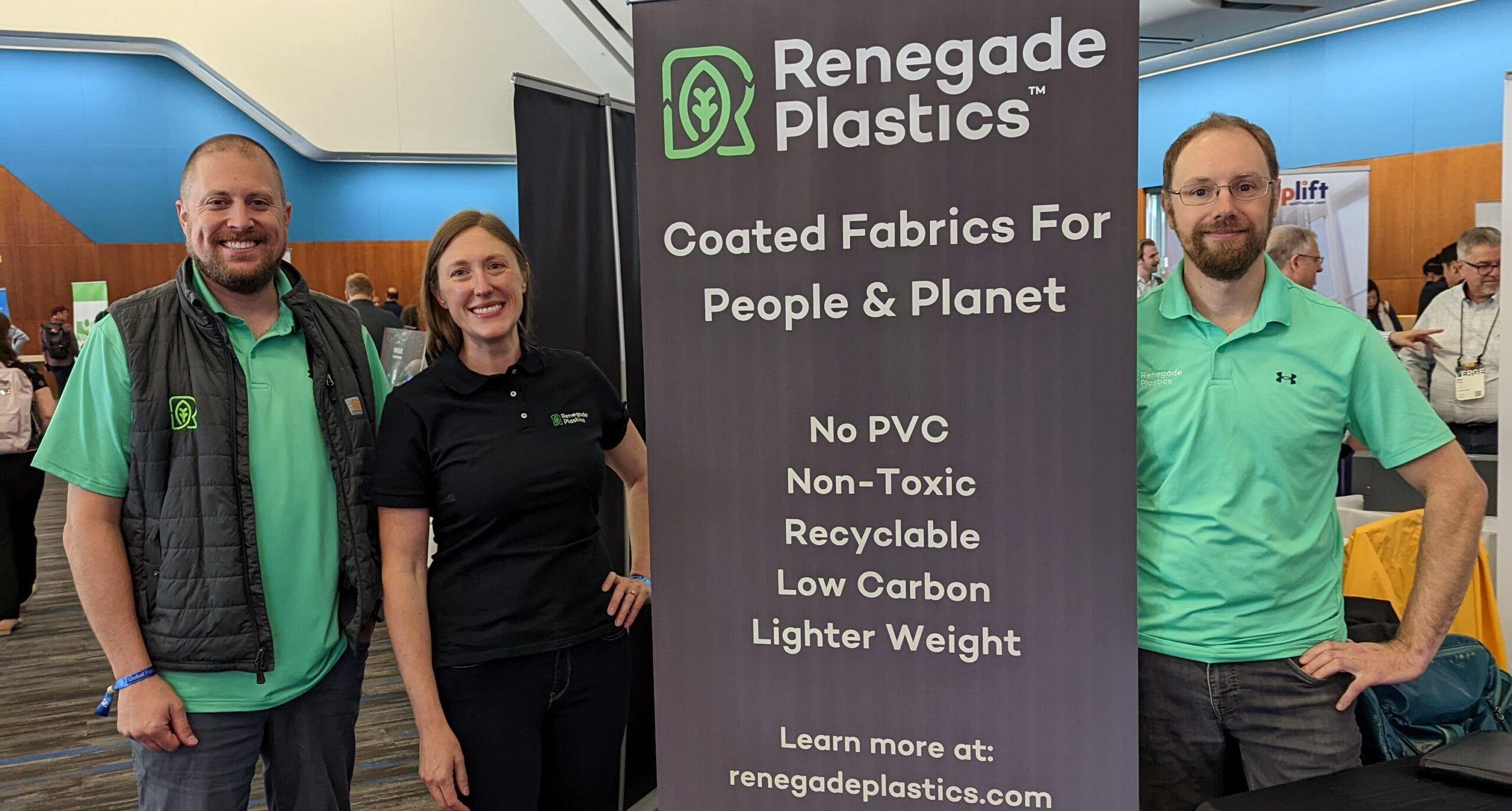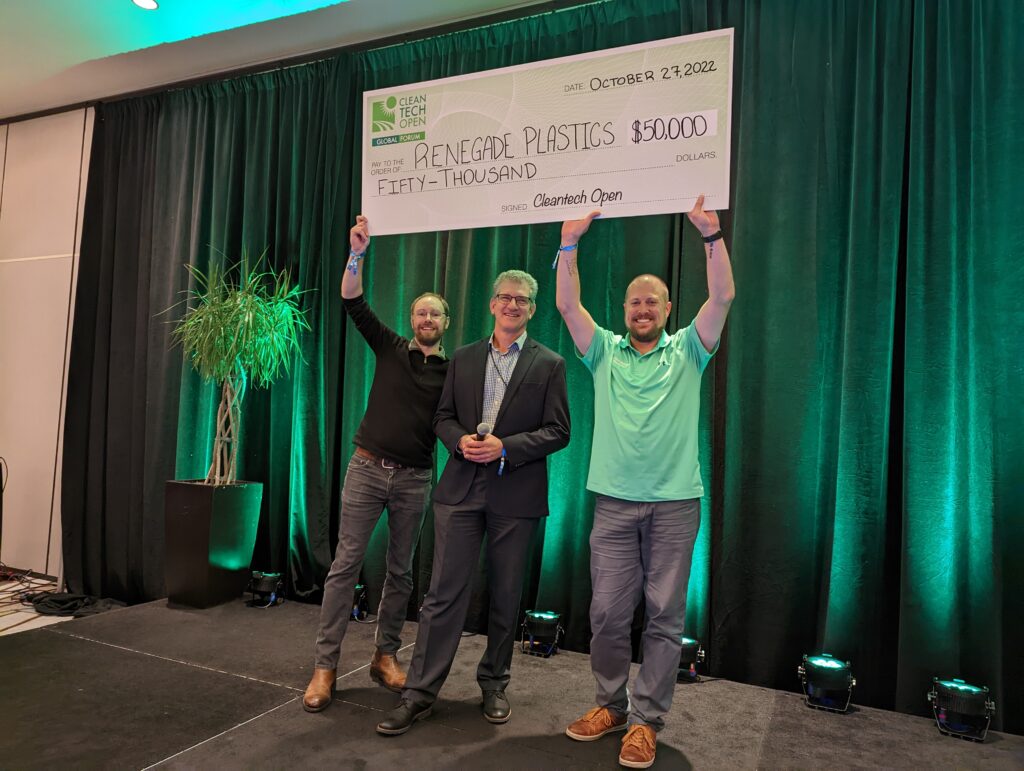Meet Curran Hughes from Renegade Plastics
Q: Can you introduce yourself and your startup?
A: My name is Curran Hughes, and I’m the president and co-founder of Renegade Plastics. Our startup is dedicated to fostering a circular economy for industrial textiles and plastics. We’re committed to innovation in the recycling and repurposing of these materials, aiming to reduce waste and promote sustainability in industries that heavily rely on plastics and textiles.
Q: What inspired the idea behind your startup?
A: The inspiration for Renegade Plastics came from my co-founder and CEO, Tony Ehrbar, who transitioned from a career in corporate consulting and strategy at Bain & Co. and United Airlines to entrepreneurship. His venture into the world of tent rental and manufacturing exposed him to the environmental and health issues associated with the materials used in these products, particularly vinyl fabric or PVC coated fabric. Recognizing the detrimental impact of vinyl chloride, a known carcinogen used in polyvinyl chloride (PVC), Tony was motivated to find a sustainable and less harmful alternative. His journey led him to discover a recyclable material with a lower carbon footprint and non-toxic properties, which was also lighter and easier to work with. Securing the exclusive rights to this innovative material, we embarked on establishing Renegade Plastics, aiming to revolutionize the industrial textiles and plastics industry by introducing eco-friendly and sustainable alternatives.
Why CleanTech Open?
Q: How did CleanTech Open become part of your journey?
A: Our path to CleanTech Open was motivated by a search for an accelerator that could help us refine our narrative and connect us with a suitable startup ecosystem. We noticed that many resources and mentors were primarily focused on SaaS startups, characterized by low overheads and rapid scalability. However, the landscape for CleanTech Open and climate tech startups presents unique challenges, including slower adoption rates, higher barriers to entry, and lower margins, which typically make them less appealing to conventional venture capitalists. In our search for support tailored to our needs, we encountered CleanTech Open. Initially centered on clean energy, CleanTech Open had expanded its focus to encompass all aspects of climate tech. This broader perspective was appealing to us because it promised access to a network of like-minded resources, investors, and missions aligned with our objectives. The emphasis CleanTech Open placed on the specific challenges and opportunities within the climate tech sector made it a perfect fit for Renegade Plastics, offering the specialized resources and support we were looking for.
How a Founder Gets In
Q: Can you describe the application process for CleanTech Open?
A: The application process for CleanTech Open was notably smooth and seamless for us. By the time we applied, we had already spent close to a year refining our pitch and storyline, which put us at an advantage compared to many other applicants. This preparatory work made the process of compiling our application relatively straightforward. Although we did have to hustle at the last minute to pull everything together and meet the deadline, overall, the application was manageable. Our advanced stage of development and clear vision likely contributed to a smoother application experience, allowing us to present a compelling case to the accelerator with confidence.
Q: How does CleanTech Open handle funding for its participants?
A: CleanTech Open’s approach to funding was a significant factor that drew us to the program. Unlike many other accelerators, CleanTech does not take equity from participating startups, which was a major relief for us. The prospect of giving up equity was a deterrent in considering other accelerators, especially those not specifically focused on CleanTech or climate tech. CleanTech Open’s model is particularly appealing because it emphasizes support without requiring equity in return. Participants have the opportunity to gain financial rewards through pitch competitions. Winning at the regional level can net you up to $5000, and triumphing in the national pitch competition could result in a $50,000 investment through a SAFE note. This setup not only avoids diluting founders’ ownership but also introduces a competitive element that can provide both funding and exposure. CleanTech Open’s non-equity approach (unless you win), combined with its supportive ecosystem, presents a compelling package for startups looking to grow within the climate tech space.
A Day in the Life at CleanTech Open
Q: What was a typical day like in the CleanTech Open program?
A: In our experience with CleanTech Open, we strategically divided responsibilities to leverage our team’s strengths, with our head of sustainability taking a leading role in the program. Given her background in sustainability and civil environmental engineering, it was an excellent opportunity for her to deepen her understanding of the business side of our operations. She actively engaged in the program’s modules, participated in mastermind sessions and advisor meetings, and collaborated closely with me on critical areas like financials, pitch decks, and business planning.
This approach allowed her to significantly enhance her business acumen, a crucial development for her role and our company’s future. Our CEO’s experience in starting a company and my background in launching internal startups within larger corporations provided us with a solid foundation in business planning. This pre-existing knowledge distinguished us from many other CleanTech Open participants, who often hailed from academic or research backgrounds and found the program’s templates and modules to be a valuable introduction to business concepts.
The program’s structure facilitated a focused and productive daily routine, enabling team members to concentrate on areas where they could learn the most while contributing effectively to our company’s progress within the accelerator.
The Distinctive Value of CleanTech Open
Q: What aspect of the CleanTech Open program was most impactful for you?
A: The most remarkable aspect of CleanTech Open, setting it apart from other accelerators, was its genuinely supportive nature. Unlike experiences where interactions can feel transactional, with a lingering sense that the accelerator is angling for a piece of your company, CleanTech Open was refreshingly different. They provided invaluable resources and advice without any expectation of equity in return. This approach allowed us to benefit from their support fully without the pressure of giving up a part of our company. Walking away from the program, we felt a sense of freedom and gratitude, not burdened by the typical obligations or significant equity stakes that might accompany other accelerator experiences. The relationship with CleanTech Open extended beyond the program’s duration, maintaining open lines of communication with their leadership. The CleanTech Open staff and leadership remain accessible and responsive, a testament to the enduring connections and support system that the program fosters among its participants. This level of engagement and the non-transactional approach truly distinguished CleanTech Open for us, highlighting their commitment to fostering growth and innovation in the CleanTech Open sector.
Equity vs. Support in Accelerator Programs
Q: What’s your perspective on the debate between not giving away equity and wanting to give equity for investment commitment?
A: This debate highlights a crucial consideration for startups choosing an accelerator. Our experience with CleanTech Open, particularly as the grand national winner, offers a unique perspective. Initially, CleanTech Open did not take equity from us, but upon winning the national competition, we entered into a $50,000 SAFE note agreement, thus granting them an equity stake. Despite this, CleanTech Open’s support and engagement exceeded that of another accelerator we participated in, which, despite having a warrant in our company, felt very transactional in every interaction and did not provide upfront capital in exchange for that warrant.
The contrast in experiences underscores that the real value of an accelerator goes beyond financial investment to the quality of support and genuine investment in a startup’s success. CleanTech Open demonstrated a deeper commitment to our growth and development, even before any equity exchange took place. Their advisors, committed to the mission, provided relevant and actionable guidance, enhancing our progress significantly. This contrasts with our experience at another accelerator, where advice felt generic and less tailored to our specific needs and sector.
CleanTech Open’s focus on creating a supportive ecosystem, including a robust alumni network and ongoing engagement opportunities, further distinguished their approach. The quality of advice and level of engagement from dedicated advisors in relevant fields contributed more to our growth than the mere act of giving away equity. This experience suggests that while equity can signify a financial investment, the real measure of an accelerator’s value lies in its ability to provide targeted, meaningful support and foster a community committed to the participants’ success.
Room for Improvement at CleanTech Open
Q: Are there areas where CleanTech Open could improve or aspects that were challenging during the program?
A: While CleanTech Open offers a highly personalized and human-centric approach, which we deeply value, one area for potential improvement is in its communications structure. The less regimented nature of the program, although beneficial for fostering personal connections, sometimes led to unclear communication. Emails and instructions weren’t always as structured or clear as they might be in more transactional, larger accelerators with a heavy reliance on automation for communication.
This more informal approach has its trade-offs. On one hand, it allows for genuine human interactions, such as the memorable experience of casually meeting and spending time with a key program organizer. These real, unplanned human connections are invaluable and something you wouldn’t typically find in more structured, automated environments.
However, the flip side is that it requires participants to navigate a bit of ambiguity at times.
Despite this, the personal touch and the smaller, more intimate cohort size significantly enhance the quality of interactions and learning among participants. This environment not only facilitates meaningful relationships within the cohort but also enhances the potential for collaboration and mutual support among startups, often leading to direct business opportunities. In summary, while there’s room for CleanTech Open to enhance clarity and organization in communications, the benefits of its human-centric approach, fostering a tight-knit community and enabling real connections, far outweigh these minor drawbacks. The program’s structure, emphasizing personal interaction over rigid formalities, contributes to a richer, more supportive accelerator experience.
Renegade Plastics’ Progress Post-CleanTech Open
Q: Can you share the current status of Renegade Plastics and the achievements post-accelerator?
A: Post-CleanTech Open, Renegade Plastics has seen significant growth and development, particularly in our fundraising and customer acquisition efforts. A pivotal moment for us was the national event organized by CleanTech Open, where we were introduced to a wide range of investors. Although none of those investors were a perfect match, the experience sharpened our fundraising strategy and prepared us for future opportunities. The program also played a crucial role in enhancing our credibility with potential customers. Following the accelerator, we attracted the attention of several multinational companies. One of these companies has since become our largest customer, a testament to the legitimacy and maturity that participation in CleanTech Open conferred on us. The recognition and validation from winning CleanTech Open have been instrumental in opening doors that typically remain closed to startups, especially in dealings with large corporate customers.
Our association with CleanTech Open, highlighted in our marketing materials, has convinced stakeholders of our potential and reliability, despite our relatively short history. This has led to pilot orders and now commercial sales with a key multinational customer, enabling us to quadruple our sales from 2022 to 2023. This remarkable growth in material goods, a sector characterized by its challenging dynamics compared to SaaS or consumer products, is particularly noteworthy. We’re now in a strong position to approach investors with a compelling story of fourfold growth in our second year, underscoring the tangible impact of the accelerator on our trajectory and the tangible value we offer in the B2B industrial sector.
Final Advice for CleanTech Open Applicants
Q: Do you have any advice for those considering applying to CleanTech Open?
A: When applying to CleanTech Open, it’s crucial to focus on the scalability of your solution. The CleanTech sector presents unique challenges in scaling a business, and demonstrating a clear, thoughtful approach to overcoming these obstacles is essential. Your application should not only showcase the innovation and potential impact of your technology but also provide a convincing strategy for how your company plans to scale. Feedback we observed, both for our application and others, consistently emphasized the importance of scalability. Even the most innovative ideas and technologies are scrutinized through the lens of scalability. Making this aspect a strong point in your application can significantly improve your chances of success with CleanTech Open. It’s not just about the idea or the technology itself, but about presenting a viable path to growth and expansion that aligns with the realities of the CleanTech industry.


